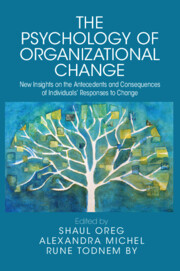 The Psychology of Organizational Change
The Psychology of Organizational Change Intentions to Resist Future Changes
from Part II - The Evolution of Change and Its Responses
Published online by Cambridge University Press: 28 September 2023
Employee resistance is often seen as the major force against the enactment of change. The literature has privileged the view that resistance, for the most extent, is the resistors’ own fault. As Ford and Ford put it, “the assumption is that they resisted a perfectly logical move.” I build on the approach that resistance to change is a form of feedback, to argue that, if organizations and their agents examine the underlying reasons, they will be better equipped to deal with the challenges related to resistance. In light of Uncertainty Reduction Theory, I also suggest that we need to move beyond the viewpoint that examines change as a one-off phenomenon and interpret it as grounded in the broader organizational life. Finally, and building on recent empirical evidence, I put forth a framework on anticipating intentions to resist future change that integrates the organization’s history of change, individual characteristics, leadership factors, and organizational factors, alongside important boundary conditions that influence the sensemaking process underlying the development of intentions to resist future changes.
To save this book to your Kindle, first ensure [email protected] is added to your Approved Personal Document E-mail List under your Personal Document Settings on the Manage Your Content and Devices page of your Amazon account. Then enter the ‘name’ part of your Kindle email address below. Find out more about saving to your Kindle.
Note you can select to save to either the @free.kindle.com or @kindle.com variations. ‘@free.kindle.com’ emails are free but can only be saved to your device when it is connected to wi-fi. ‘@kindle.com’ emails can be delivered even when you are not connected to wi-fi, but note that service fees apply.
Find out more about the Kindle Personal Document Service.
To save content items to your account, please confirm that you agree to abide by our usage policies. If this is the first time you use this feature, you will be asked to authorise Cambridge Core to connect with your account. Find out more about saving content to Dropbox.
To save content items to your account, please confirm that you agree to abide by our usage policies. If this is the first time you use this feature, you will be asked to authorise Cambridge Core to connect with your account. Find out more about saving content to Google Drive.